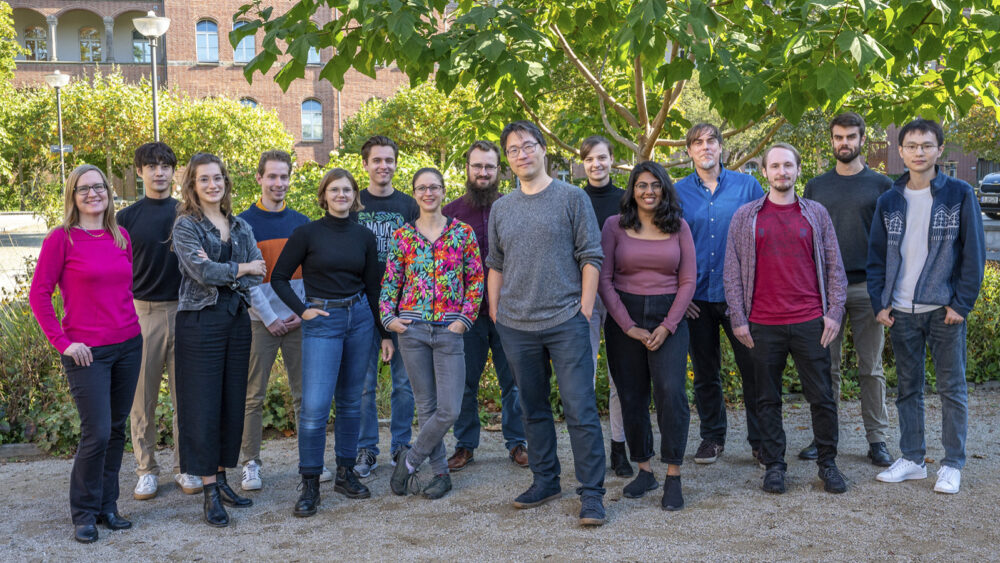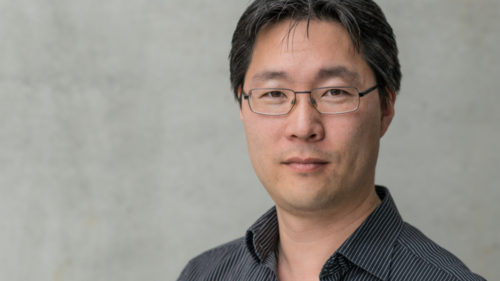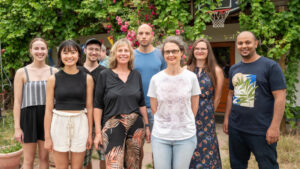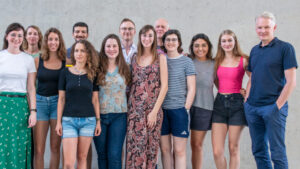

Chang lab
How does the intestinal microbiota influence chronic inflammation?
Schwiete Lab for Microbiota and inflammation
About 10% of the German population suffer from chronic inflammatory diseases such as rheumatoid arthritis, psoriasis or intestinal inflammation. Many studies have already shown that the composition of the gut flora (intestinal microbiota) is altered in patients compared to healthy people. This alteration is called dysbiosis. Funded by the Dr. Rolf M. Schwiete Foundation, we are investigating the role of the intestinal microbiota in the development and chronification of inflammation. The aim is to understand the dialogue between the microbiota and the host in order to elucidate the causal link between bacteria and chronic inflammatory diseases and to develop new therapeutic approaches by targeting the host-microbiota crosstalk.
Cytometric fingerprinting of disease-associated microbiota.
To gain a better understanding of the composition, functionality and dynamics of the microbiota we use high-resolution microbiota cytometry. We developed this method in collaboration with the Gastroenterology Department of Charité – Universitätsmedizin Berlin, Campus Benjamin Franklin and the Helmholtz Center for Environmental Research in Leipzig. We visualize bacteria using staining reagents, such as the DNA and light scattering profile to generate “microbial community fingerprints”. In addition, we characterize the labeling of bacteria with endogenous antibodies and their metabolic activity or sugar residues on the surface to study the composition of the microbiota and its changes in disease and under therapy precisely. With microbiota cytometry, we can rapidly compare the microbiota from stool samples of healthy and diseased individuals to identify bacterial communities associated with different disease symptoms and to determine causal relationships. A major advantage of microbiota cytometry is the ability to analyze in realtime and sort bacteria directly from stool samples.
Novel anti-inflammatory probiotics.
We have recently identified bacteria of the genus Anaeroplasma that have the potential to inhibit inflammation by promoting the expression of the anti-inflammatory cytokine TGF-β. This in turn enhances the production of so-called IgA antibodies. These “mucosal antibodies,” are part of the intestinal barrier that, among other things, prevents bacteria from uncontrolled passage through the intestinal mucosa and initiating inflammation. We are in the process of deciphering the molecular mechanisms of how Anaeroplasma modulates the immune system. Furthermore, we are investigating whether and how Anaeroplasma can be used as an anti-inflammatory “probiotic” in chronic inflammatory diseases.
The gut-joint axis in rheumatoid arthritis.
We are investigating the hypothesis that the autoimmune responses, for example those that target the joint in rheumatoid examples, originate in the gut. The intestinal microbiome in its entirety is estimated to comprise over 3 million genes, an immense source of potential antigens, some of which could resemble endogenous antigens that have the potential to trigger an autoimmune response. As part of the EU-funded project RTCure, we are collaborating with partners at the University of Birmingham, UK, the Karolinska Institute, Stockholm, Sweden, and Leiden University, the Netherlands, to investigate the extent to which antibodies isolated from patients with rheumatoid arthritis bind bacteria from the intestinal flora and to identify these bacteria. Such bacteria could induce and drive rheumatoid inflammation.
In vitro models for microbiota-host interaction.
We are developing two- and three-dimensional intestinal models to study the impact of intestinal microbial stimuli on intestinal epithelial cells in vitro. Furthermore, we are developing cultivation methods that will allow us to also maintain the intestinal microbiota in its original composition in vitro to study effects of environmental stimuli on the microbial community structure. Such in vitro models will enable us to reduce and perhaps even completely avoid animal experiments in the sense of the 3R concept (Replace, Reduce, Refine).
The intestinal microbiota and SARS-CoV-2
In order to understand whether and to what extent intestinal bacteria could influence the immune response against SARS-CoV-2, we analyze in cooperation with the AG Kruglov, the AG Mei and Prof. Michael Lohoff (University of Marburg) stool samples of human donors, with the aim to correlate the composition of the intestinal microbiota with the immune response induced by a SARS-CoV2 infection or by vaccination against the virus.
Keywords
Microbiota
Microbiota-Cytometry
IgA
Chronic inflammation

Group leader
Prof. Dr. rer. nat. Hyun-Dong Chang
Scientists
Amro Abbas
Vinod Devaraj
Sebastian Ferrara
Jannike Krause
Ph.D. students
Lisa Budzinski
Qing Hu
Gi-Ung Kang
Robin Kempkens
Toni Sempert
Aayushi Shah
Victoria von Goetze
Bachelor/Diploma/Master students
Yannik Goerkis
Pedro Gomes
Pavlo Krysko
Josephine Münch
Quoc Viet Hoang
David Lallinger
Leonie Lietz
Mert Torlak
Technician
René Maier
Student assistant
Georgi Antonovych
- Dr. Petra Bacher, IKMB – Christian-Albrechts-Universität zu Kiel, Germany
- Dr. Charlotte Esser, Leibniz Forschungsinstitut für Umweltmedizin Düsseldorf, Germany
- Dr. Ahmed Hegazy, Charité Universitätsmedizin Berlin, Medizinische Klinik I, Germany
- Prof. Dr. med Kai Hildner Universitätsklinkium Erlangen
- Dr. Kathrin Hochrath, AG Charlotte Esser, Leibniz-Institut für Umwelt-Medizinische Forschung
- Dr. Andrey Kruglov, DRFZ, Germany
- Dr. Anja Kühl, Charité Universitätsmedizin Berlin, Medizinische Klinik I, Germany
- Dr. Mir-Farzin Mashreghi, DRFZ, Germany
- Vivianne Malmström (Karolinska Institut, Stockholm, Schweden)
- Dr. Susann Müller, Helmholtz Institut für Umweltforschung, Leipzig, Germany
- Dr. Denis Poddubnyy, Charité Universitätsmedizin Berlin, Medizinische Klinik I, Germany
- Anne Regierer, DRFZ, Germany
- Dr. Chiara Romagnani, Charité Universitätsmedizin Berlin, Medizinische Klinik I, Germany
- Dr. Dagmar Scheel-Toellner, Universität Birmingham, Germany
- Dr. Maren Schmiester, Charité Universitätsmedizin Berlin, Medizinische Klinik mit Schwerpunkt Hämatologie, Onkologie und Tumorimmunologie, Germany
- Dr. Alexander Scheffold, Christian-Albrechts-Universität zu Kiel, Germany
- Dr. Anja Schirbel, Charité Universitätsmedizin Berlin, Medizinische Klinik mit Schwerpunkt Hepatologie und Gastroenterologie, Germany
- Dr. Britta Siegmund, Charité Universitätsmedizin Berlin, Medizinische Klinik I, Germany
- Dr. Rene Toes and Dr. Ulrich Scherer, Leiden University Medical Centre, The Netherlands
- Dr. Carl Weidinger, Charité Universitätsmedizin Berlin, Medizinische Klinik I, Germany
- Dr. Jakob Zimmermann, Universität Bern, Germany
- Krause JL, Pierzchalski A, Chang HD, Zenclussen AC, Bauer M, Herberth G. Bisphenols, but not phthalate esters, modulate gene expression in activated human MAIT cells in vitro. Toxicol Rep. 2023 Mar 1;10:348-356. doi: 10.1016/j.toxrep.2023.02.017. PMID: 36923442; PMCID: PMC10008924.
- Kupschus J, Janssen S, Hoek A, Kuska J, Rathjens J, Sonntag C, Ickstadt K, Budzinski L, Chang HD, Rossi A, Esser C, Hochrath K. Rapid detection and online analysis of microbial changes through flow cytometry. Cytometry A. 2022 Nov 10. doi: 10.1002/cyto.a.24704. Epub ahead of print. PMID: 36354152.
- Schmiester M, Maier R, Riedel R, Durek P, Frentsch M, Kolling S, Mashreghi MF, Jenq R, Zhang L, Peterson CB, Bullinger L, Chang HD, Na IK. Flow cytometry can reliably capture gut microbial composition in healthy adults as well as dysbiosis dynamics in patients with aggressive B-cell non-Hodgkin lymphoma. Gut Microbes. 2022 Jan-Dec;14(1):2081475. doi: 10.1080/19490976.2022.2081475. PMID: 35634713; PMCID: PMC9154785.
- Krause JL, Engelmann B, Nunes da Rocha U, Pierzchalski A, Chang HD, Zenclussen AC, von Bergen M, Rolle-Kampczyk U, Herberth G. MAIT cell activation is reduced by direct and microbiota-mediated exposure to bisphenols. Environ Int. 2022 Jan;158:106985. doi: 10.1016/j.envint.2021.106985. Epub 2021 Nov 21. PMID: 34991247.
- Li J, Reinke S, Shen Y, Schollmeyer L, Liu YC, Wang Z, Hardt S, Hipfl C, Hoffmann U, Frischbutter S, Chang HD, Alexander T, Perka C, Radbruch H, Qin Z, Radbruch A, Dong J. A ubiquitous bone marrow reservoir of preexisting SARS-CoV-2-reactive memory CD4+ T lymphocytes in unexposed individuals. Front Immunol. 2022 Oct 4;13:1004656. doi: 10.3389/fimmu.2022.1004656. PMID: 36268016; PMCID: PMC9576920.
- Cendón C, Du W, Durek P, Liu YC, Alexander T, Serene L, Yang X, Gasparoni G, Salhab A, Nordström K, Lai T, Schulz AR, Rao A, Heinz GA, Stefanski AL, Claußnitzer A, Siewert K, Dörner T, Chang HD, Volk HD, Romagnani C, Qin Z, Hardt S, Perka C, Reinke S, Walter J, Mashreghi MF, Thurley K, Radbruch A, Dong J. Resident memory CD4+ T lymphocytes mobilize from bone marrow to contribute to a systemic secondary immune reaction. Eur J Immunol. 2022 May;52(5):737-752. doi: 10.1002/eji.202149726. Epub 2022 Mar 14. PMID: 35245389.
- Burt P, Cornelis R, Geißler G, Hahne S, Radbruch A, Chang HD, Thurley K. Data-Driven Mathematical Model of Apoptosis Regulation in Memory Plasma Cells. Cells. 2022 May 5;11(9):1547. doi: 10.3390/cells11091547. PMID: 35563853; PMCID: PMC9102437.
- Cornelis R, Chang HD, Radbruch A. Keeping up with the stress of antibody production: BAFF and APRIL maintain memory plasma cells. Curr Opin Immunol. 2021 Jul 21;71:97-102. doi: 10.1016/j.coi.2021.06.012. PMID: 34303157.
- Radbruch A, Chang HD. A long-term perspective on immunity to COVID. Nature. 2021 Jun 14. doi: 10.1038/d41586-021-01557-z.
- Chang HD, Radbruch A. Maintenance of quiescent immune memory in the bone marrow. Eur J Immunol. 2021 May 19. doi: 10.1002/eji.202049012.
- Shah A, Chang HD. Quantifying Antigen-Specific T-Cells by Assessing Their Antigen-Induced Proliferation. Methods Mol Biol. 2021;2285:131-139. doi: 10.1007/978-1-0716-1311-5_11. PMID: 33928549.
- Cossarizza A, Chang HD, Radbruch A et al, Guidelines for the use of flow cytometry and cell sorting in immunological studies (third edition). Eur J Immunol. 2021 Dec;51(12):2708-3145. doi: 10.1002/eji.202170126. Epub 2021 Dec 7. PMID: 34910301.
- Christina Stehle, Timo Rückert, Rémi Fiancette, Dominika W. Gajdasik, Claire Willis, Carolin Ulbricht, Pawel Durek, Mir-Farzin Mashreghi, Daniela Finke, Anja Erika Hauser, David R. Withers, Hyun-Dong Chang, Jakob Zimmermann*, and Chiara Romagnani* (*equal contribution), T-bet and RORa control lymph node formation by regulating embryonic innate lymphoid cell differentiation, Nature Immunology, 2021, doi: 10.1038/s41590-021-01029-6
- Maschmeyer P, Chang HD, Cheng Q, Mashreghi MF, Hiepe F, Alexander T, Radbruch A. Immunological memory in rheumatic inflammation – a roadblock to tolerance induction. Nat Rev Rheumatol. 2021 Apr 6. doi: 10.1038/s41584-021-00601-6.
- Ferreira-Gomes M, Kruglov A, Durek P, Heinrich F, Tizian C, Heinz GA, Pascual-Reguant A, Du W, Mothes R, Fan C, Frischbutter S, Habenicht K, Budzinski L, Ninnemann J, Jani PK, Guerra GM, Lehmann K, Matz M, Ostendorf L, Heiberger L, Chang HD, Bauherr S, Maurer M, Schönrich G, Raftery M, Kallinich T, Mall MA, Angermair S, Treskatsch S, Dörner T, Corman VM, Diefenbach A, Volk HD, Elezkurtaj S, Winkler TH, Dong J, Hauser AE, Radbruch H, Witkowski M, Melchers F, Radbruch A, Mashreghi MF. SARS-CoV-2 in severe COVID-19 induces a TGF-β-dominated chronic immune response that does not target itself. Nat Commun. 2021 Mar 30;12(1):1961. doi: 10.1038/s41467-021-22210-3. PMID: 33785765.
- Müller S, Chang HD. Microorganisms and Their Activities Within Microbial Communities. Cytometry A. 2020 Jul;97(7):681-682. doi: 10.1002/cyto.a.24175. Epub 2020 Jul 10. PMID: 32583569.
- Maschmeyer P, Heinz GA, Skopnik CM, Lutter L, Mazzoni A, Heinrich F, von Stuckrad SL, Wirth LE, Tran CL, Riedel R, Lehmann K, Sakwa I, Cimaz R, Giudici F, Mall MA, Enghard P, Vastert B, Chang HD, Durek P, Annunziato F, van Wijk F, Radbruch A, Kallinich T, Mashreghi MF. Antigen-driven PD-1+ TOX+ BHLHE40+ and PD-1+ TOX+ EOMES+ T lymphocytes regulate juvenile idiopathic arthritis in situ. Eur J Immunol. 2020 Dec 9. doi: 10.1002/eji.202048797. Epub ahead of print. PMID: 33296081.
- Romero-Olmedo AJ, Schulz AR, Huber M, Brehm CU, Chang HD, Chiarolla CM, Bopp T, Skevaki C, Berberich-Siebelt F, Radbruch A, Mei HE, Lohoff M. Deep phenotypical characterization of human CD3+ CD56+ T cells by mass cytometry. Eur J Immunol. 2021 Mar;51(3):672-681. doi: 10.1002/eji.202048941. Epub 2020 Dec 15. PMID: 33231295.
- Cornelis R, Hahne S, Taddeo A, Petkau G, Malko D, Durek P, Thiem M, Heiberger L, Peter L, Mohr E, Klaeden C, Tokoyoda K, Siracusa F, Hoyer BF, Hiepe F, Mashreghi MF, Melchers F, Chang HD, Radbruch A. Stromal Cell-Contact Dependent PI3K and APRIL Induced NF-κB Signaling Prevent Mitochondrial- and ER Stress Induced Death of Memory Plasma Cells. Cell Rep. 2020 Aug 4;32(5):107982. doi: 10.1016/j.celrep.2020.107982. PMID: 32755576; PMCID: PMC7408492.
- Riedel R, Addo R, Ferreira-Gomes M, Heinz GA, Heinrich F, Kummer J, Greiff V, Schulz D, Klaeden C, Cornelis R, Menzel U, Kröger S, Stervbo U, Köhler R, Haftmann C, Kühnel S, Lehmann K, Maschmeyer P, McGrath M, Naundorf S, Hahne S, Sercan-Alp Ö, Siracusa F, Stefanowski J, Weber M, Westendorf K, Zimmermann J, Hauser AE, Reddy ST, Durek P, Chang HD, Mashreghi MF, Radbruch A. Discrete populations of isotype-switched memory B lymphocytes are maintained in murine spleen and bone marrow. Nat Commun. 2020 May 22;11(1):2570. doi: 10.1038/s41467-020-16464-6. PMID: 32444631; PMCID: PMC7244721.
- Beller A, Kruglov A, Durek P, von Goetze V, Werner K, Heinz GA, Ninnemann J, Lehmann K, Maier R, Hoffmann U, Riedel R, Heiking K, Zimmermann J, Siegmund B, Mashreghi MF, Radbruch A, Chang HD. Specific microbiota enhances intestinal IgA levels by inducing TGF-β in T follicular helper cells of Peyer’s patches in mice. Eur J Immunol. 2020 Feb 17. doi: 10.1002/eji.201948474.
- Esser C, Hochrath K, Teichweyde N, Krutmann J, Chang HD. Beyond sequencing: fast and easy microbiome profiling by flow cytometry. Arch Toxicol. 2019 Sep;93(9):2703-2704. doi: 10.1007/s00204-019-02527-1. Epub 2019 Jul 20. PubMed PMID: 31327023.
- Chang HD, Tokoyoda K, Hoyer B, Alexander T, Khodadadi L, Mei H, Dörner T, Hiepe F, Burmester GR, Radbruch A. Pathogenic memory plasma cells in autoimmunity. Curr Opin Immunol. 2019 Oct 29;61:86-91. doi:10.1016/j.coi.2019.09.005.
- Zimmermann J, Durek P, Kühl AA, Schattenberg F, Maschmeyer P, Siracusa F, Lehmann K, Westendorf K, Weber M, Riedel R, Müller S, Radbruch A, Chang HD. The intestinal microbiota determines the colitis-inducing potential of T-bet-deficient Th cells in mice. Eur J Immunol. 2018 Jan;48(1):161-167. doi: 10.1002/eji.201747100.
- Rolf M. Schwiete Stiftung
- Europäische Fonds für regionale Entwicklung (EFRE): Projekt – BacFlow
- TRR130 Projekt 16 (Radbruch/Chang): Deciphering the Survival Code of Memory Plasma Cells and Memory B Cells (beendet)
- TRR241 Projekt B03 (Chang/Radbruch): The intestinal epithelial cells in the dialogue between microbiota and the immune system
- EU H2020 IMI2 RTCure: WP3 (Work package lead Chang/Radbruch)
- EU H2020 IMI2 3TR


 Deutsch
Deutsch


